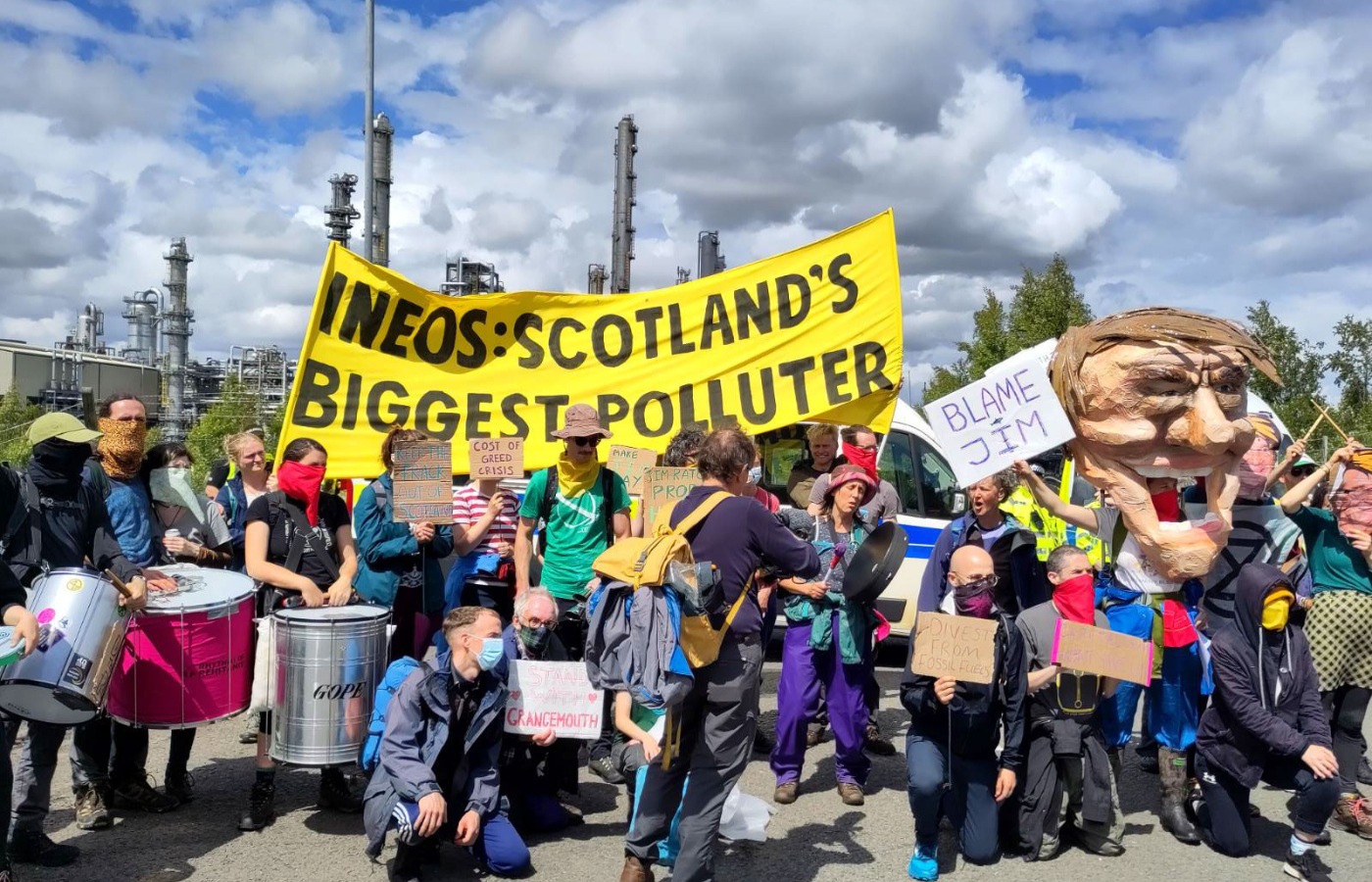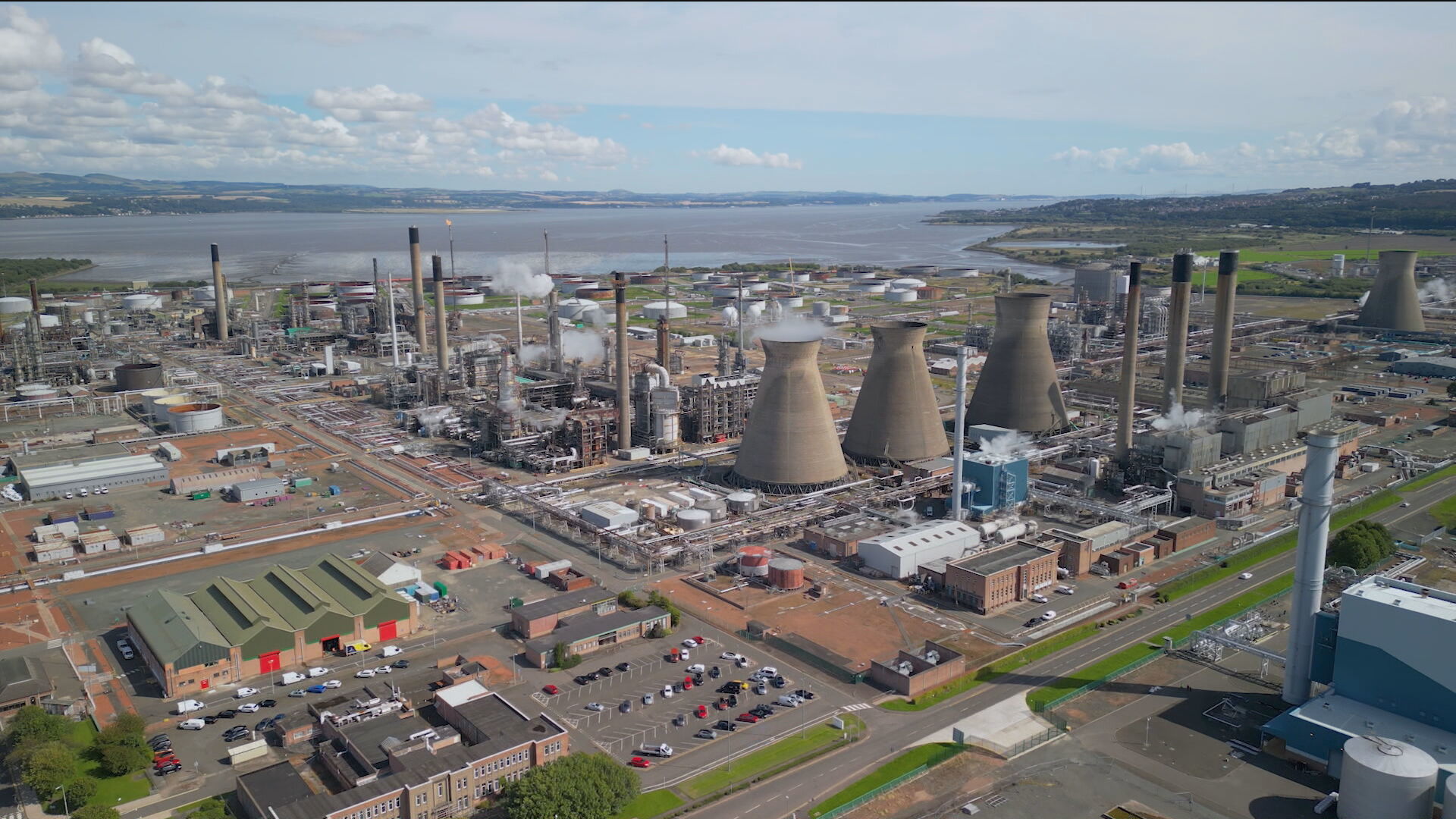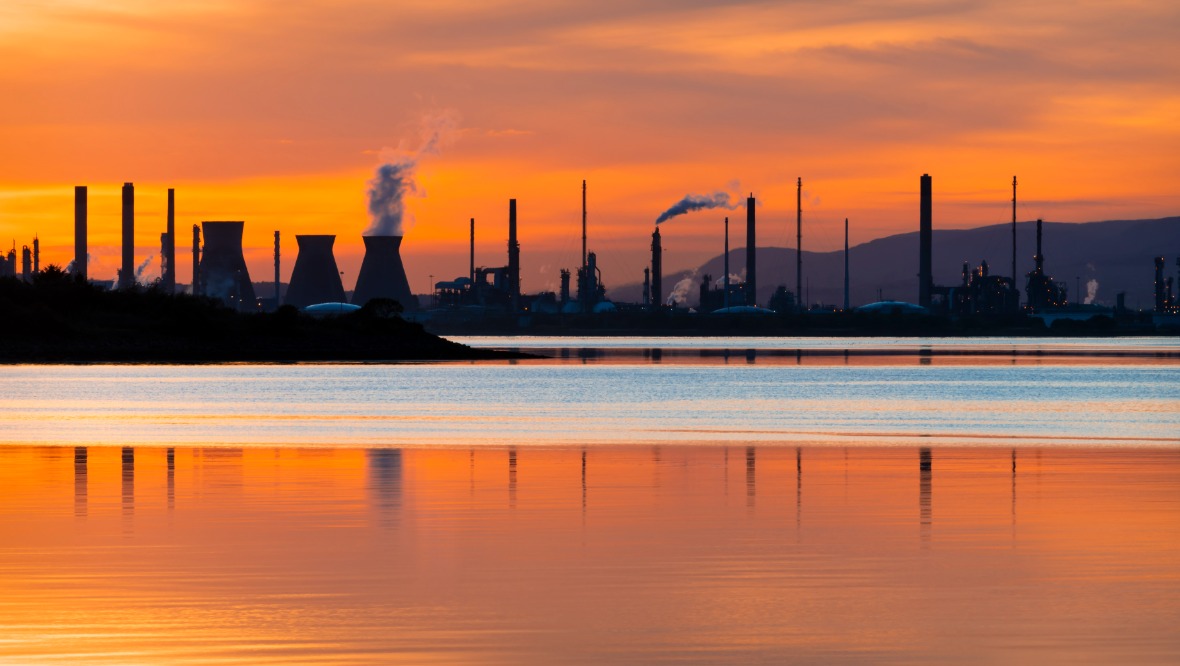For almost 100 years, Grangemouth has been synonymous with flames, steam and smoke rising into the air from the town’s oil refinery.
Established in 1924, it has powered Scotland for decades, provided jobs to thousands of people in the oil and gas sector, and generated billions of pounds for the Scottish economy.
But as the world continues its transition to a net zero future and governments focus on energy diversification, the future of Petroineos’ plant at Grangemouth has started to look very uncertain.
There was widespread shock among locals after the company announced last November that operations at Grangemouth – Scotland’s sole oil refinery – would cease in 2025 as the site transitioned into a fuel import terminal.
Generations of families from the Falkirk area and beyond have worked at the refinery since it was built in the 1920s.
But it was confirmed on Thursday that Scotland’s last oil refinery will cease production in the first half of next year.
Petroineos said it is the UK’s oldest refinery and cannot compete with bigger, newer refineries across the globe.
Following the company’s announcement, the Scottish and UK Governments unveiled a joint investment plan for Grangemouth.
The £100m package includes £20m in joint funding from the Scottish and UK Governments on top of £80m in joint funding from the two governments for the Falkirk and Grangemouth Growth Deal.
Gillian Martin, the cabinet secretary for energy and net zero, said: “This significant package of support combines immediate help for affected workers and a long-term contribution to ensure that Grangemouth continues to thrive in the future.
“We are clear that there should be a just transition for the refinery site and we remain committed to bringing forward low carbon opportunities that will sustain skilled jobs across the wider area for many years to come.”
Watch
Scotland Tonight analysis: The impact of Grangemouth refinery closure
Grangemouth provides aviation fuel for Scotland’s major airports – Glasgow, Edinburgh and Prestwick – and has been a major supplier of petrol and diesel ground fuels across the country’s central belt.
The establishment of BP’s Forties Pipeline System, which transports oil directly to the complex, has been crucial to Grangemouth’s recent operations.
It currently has the capacity to produce around seven million tonnes of fuels and 1.4 million tonnes of petrochemicals every year. Some 80% of Scotland’s fuel is supplied by the Grangemouth crude oil refinery.
Origins
The origin of Ineos’ operations at Grangemouth can be traced as far back as 1850, when Glasgow scientist Dr James ‘Paraffin’ Young took out a patent for ‘treating bituminous coals to obtain paraffine therefrom’.
The first oil works in the world were opened in Bathgate in 1851, producing oil from shale or coal.
In 1859, the world’s first oil well was sunk in Pennsylvania in the United States and, as the price of oil dropped, many Scottish works closed or concentrated production on lubricants, paraffin wax and sulphate of ammonia.
By 1919 the six surviving companies, including Young’s Paraffin Light and Mineral Oil Company Limited, came together under the management of the newly formed Scottish Oils.
In the same year, Scottish Oils was acquired by the Anglo-Persian Oil Company, later to become BP.
 STV News
STV NewsBP was persuaded by Scottish Oils to locate a refinery near Grangemouth, rather than in north east England, because of its flat ground to the east, its transport links and, most importantly, the rich vein of labour skilled in shale oil refining.
By 1924, the refinery was in operation. It maintained a throughput of 360,000 tonnes per year until the outbreak of war in 1939 when imports of oil dwindled and forced it to close.
The refinery re-opened in 1946 to a world even more hungry for refined oil products. This demand, coupled with economic reasons, made it essential that the crude oil was utilised completely, and this led to the growth of the petrochemical industry.
But the world is now grappling with another major energy shift as a result of climate change.
While preparing the refinery site for the transition to an import terminal, Petroineos says it is working with the UK and Scottish governments to analyse options for Grangemouth to become a low-carbon fuels manufacturing hub.
An initial feasibility study, known as Project Willow, is assessing various low-carbon opportunities from technical, economic, commercial, regulatory, environment, community and skills perspectives.
Frank Demay, chief executive officer at Petroineos Refining, said: “The energy transition is happening now and it is happening here.
“Demand for key fuels we produce at Grangemouth has already started to decline and, with a ban on new petrol and diesel cars due to come into force within the next decade, we foresee that the market for those fuels will shrink further.
“That reality, aligned with the cost of maintaining a refinery built half a century ago, means we are exploring ways to adapt our business.
“The action we are taking to create an import terminal will safeguard fuel supply for Scotland. We currently expect Grangemouth to be ready to operate as a national distribution hub for finished fuels in Q2 next year.”
Decarbonisation
The Scottish Government has committed to a target of net-zero greenhouse gas emissions by 2045. It has been looking at how to decarbonise the energy industry, without sacrificing jobs.
Grangemouth is a massive polluter – accounting for 9% of Scotland’s total emissions.
While environmental activists have been campaigning for the closure of the site – they say it’s being handled irresponsibly.
 Climate Camp Scotland
Climate Camp ScotlandRosie Hampton, just transition campaigner at Friends of the Earth Scotland, said: “Workers at Grangemouth ultimately deserve far better than how they have been treated today by faraway bosses in distant boardrooms, who have not consulted them at all about their future.
“Escalating climate breakdown means a transition away from fossil fuels is essential, so this sort of transition process is inevitable and it’s a real shame that the Scottish Government and Ineos have not brought workers and trade unions around the table to have a say in what is a vital discussion.”
As part of the energy transition, the UK Government announced earlier this month it will award licences for oil and gas projects in the North Sea annually.
Legislation set out in the King’s Speech requires the North Sea Transition Authority (NSTA) to invite applications for new production license on an annual basis to “safeguard the prosperity of our country”.
Union describe closure as ‘act of industrial vandalism’
A consultation has been launched with workers at the site but it’s expected only around 75 jobs will remain in the Falkirk plant.
Sharon Graham, the general secretary of trade union Unite, described the decision to close the plant as “an act of industrial vandalism, pure and simple”.
She said: “This dedicated workforce has been let down by PetroIneos and by the politicians in Westminster and Holyrood who have failed to guarantee production until alternative jobs are in place.
“This is now the last chance for this Labour government to show whether its really on the side of workers and communities. The road to net zero cannot be paid for with workers’ jobs.
“The government must put its money where its mouth is to ensure the jobs are safeguarded. This is the only refinery left in Scotland and it must remain. There are alternative plans.
“This is yet another example of workers paying for a crisis they did not create while billionaire owners laugh all the way to the bank “
Unite is now in high level talks with the government about alternatives for the site including the production of sustainable aviation fuel.
Derek Thomson, Unite Scottish secretary said: “The sole objective for Unite remains that the jobs at the refinery and thousands more in the supply chain are protected by any means.
“Unite does not accept that the future of the refinery should have been left to the whim and avarice of shareholders. The complex is critical to the nation’s manufacturing base and energy security. The governments involved cannot simply hide behind the convenient smokescreen that this is a commercial decision which they couldn’t influence.”
 STV News
STV NewsWhat has been the political reaction?
Michelle Thomson, the SNP MSP for Falkirk East, said she had written to both the Scottish and UK governments about the closure.
She said: “My thoughts are first and foremost with the workers at the refinery for whom today’s announcement will be a shock, if not a surprise.
“I am also very mindful of the community for whom a just transition will feel too far away.
“I will be doing everything in my power to sustain the life of the refinery and to ensure it, and the important chemical cluster around it can be supported.
“I have today written to both the Scottish and UK governments with various questions about what could and should be done.
“The questions include protecting workers rights, timescales, the continuation of Project Willow, implications for the Finnart pipeline, and a call for the UK government to change the regulations concerning hydrotreated esters and fatty acids (HEFA) to support the development of sustainable aviation fuels.
“I would also point out that Tata Steel has secured £500m from the UK Government to pursue a green agenda – I will be seeking similar support for Grangemouth.”
 STV News
STV NewsIneos founder Ratcliffe turned his attention from energy to football
Petroineos was formed in 2011 between state-owned Chinese oil giant PetroChina and Ineos, part of billionaire Sir Jim Ratcliffe’s petrochemical empire.
In 2011, a 50/50 joint venture was formed between INEOS and PetroChina to own and operate the Grangemouth refinery, which has a refining capacity of 150,000 barrels per day (bpd).
The standalone company, Petroineos, is a major supplier of fuels to Scotland, Northern Ireland and northern England.
Last year, Ratcliffe hit out at what he sees as the UK’s “total lack” of an energy policy, which he branded “completely irresponsible”.
The billionaire owner of the chemicals group accused the UK Government of seeking to discourage local oil and gas production and making the country reliant on supplies from overseas producers.
He made the remarks as he revealed his company’s Forties Pipeline System had seen North Sea oil flows drop by 40% over the last six years.
Ineos has been forced to close a third of the system’s processing capacity as a result of the recent reduction in oil flow, Ratcliffe said, potentially threatening hundreds of jobs that depend on it.
He blamed the decline on a combination of windfall taxes and “negative signals” he claims politicians have been making about the future of the North Sea in recent times.
Earlier this year, Ratcliffe completed his £1.3bn deal to become minority owner of Premier League giant Manchester United.
He completed his purchase of 25% of the shares owned by the Glazer family, who have been United’s majority owners since their controversial leveraged buyout in 2005.
The Ineos chairman paid 33 US dollars (£26) for each of those shares and the same price for 25% of Class A shares, with ten times fewer voting rights, following a tender process.
It means Ratcliffe owns a 27.7% stake in the club, which will increase to 28.9% by the end of the year.
Sir Jim argued the “worrying” decline puts UK consumers “at the mercy” of foreign producers and is causing huge volatility in energy prices, pushing ever increasing numbers of people into fuel poverty.
He is understood to be on the verge of a £1.25bn deal to secure a 25% stake in Manchester United, but sources have indicated that an announcement may not come now until next week.
Ratcliffe is set to acquire significant control of football operations at United as part of his investment when it is ultimately confirmed, while it has also been reported that he would provide an additional £245m to upgrade club infrastructure.
Follow STV News on WhatsApp
Scan the QR code on your mobile device for all the latest news from around the country


 iStock
iStock

























